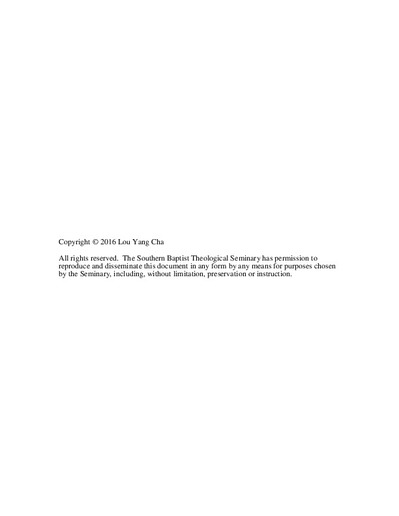| dc.description.abstract | In this holistic, multiple-case, replication study, key informant interviews, focus group interviews, documents, and field notes were gathered, coded, and analyzed from three stratified, randomly selected Hmong C&MA churches to discover the family ministry perceptions and practices of these Hmong churches. These family ministry perceptions and practices were then compared to the religious education of children within the traditional Hmong religion in order to identify areas for contextualization.
The Hmong are a collective, clan-kinship, indigenous people group of southern China and Southeast Asia who converted to Christianity in 1949 through the missionary work of the Christian and Missionary Alliance (C&MA). Prior to conversion, the Hmong practiced animism, shamanism, ancestral worship, and reincarnation. Children were religiously instructed through informal, oral, experiential, and intergenerational learning. The home was the central shrine for religious instruction via altars, offerings, sacrifices, and rituals. Fathers were the primary religious instructors of children, followed by clan spirit fathers, and the shaman and religious experts.
Through this research, it was discovered that since conversion, the Hmong churches have experienced a paradigm shift in the religious education of their children: from an oral, informal, ritual-oriented, home-centered, father-led religious education paradigm to a literate, semi-formal, classroom-oriented, church-centered, pastor-led Christian education paradigm. The segmented programmatic model of family ministry was established in the early Hmong church by C&MA missionaries, and has continued to be perpetuated in the three case studies. The age-segmented children’s church and Sunday school were the principle Christian education programs utilized in these churches.
The effects of the segmented programmatic family model in the Hmong churches have been both positive and negative. Some children have been evangelized and discipled in the Christian faith. Some have drifted from the Christian faith due to lack of parental involvement, and the lack of mature adult teachers. To develop a more contextualized family ministry within the Hmong church context, children need to be equally valued, fathers elevated as primary spiritual leaders, the home re-established as the center for Christian education, and intergenerational mentoring increased so that Christian faith can be transmitted to the next generations. | en_US |

